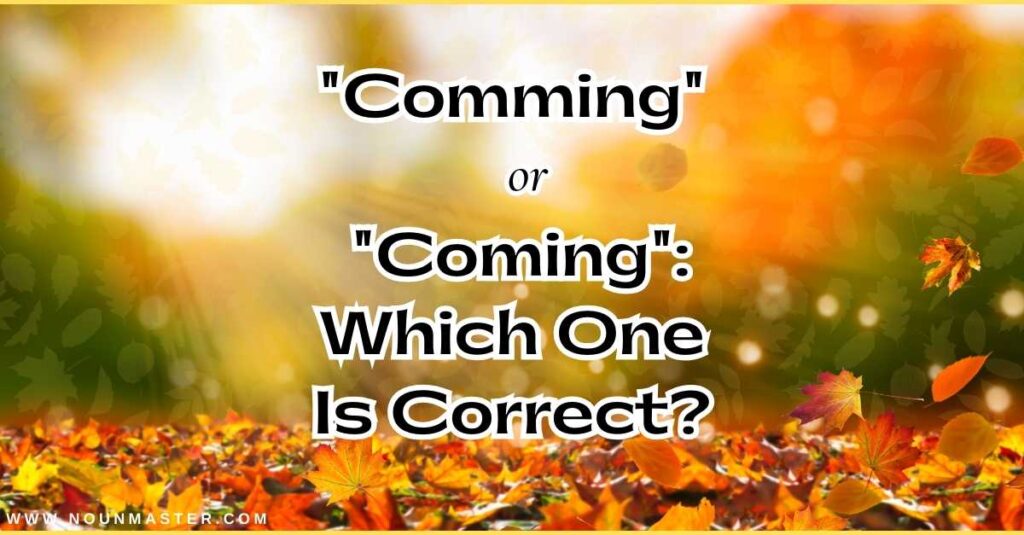Have you ever found yourself stuck, wondering whether to write “comming” or “coming”? You’re not alone! Many people get confused by this common spelling mistake. Here’s the quick answer: the correct word is “coming.”
But why is “comming” wrong? In this short guide, we’ll explain the simple spelling rule behind it and help you avoid this error in the future. Let’s clear up the confusion once and for all!
Comming Meaning: Explained in Simple Words
Comming” is a common spelling mistake that many people make when they actually mean to write “coming.” In this guide, we’ll explain the difference, why “comming” is incorrect, and how to avoid this mistake in your writing. If you’ve ever wondered whether “comming” is right, read on to get the answer and improve your spelling today!
“Coming” Meaning: Explained in Simple Words
The word “coming” is commonly used in English and simply means something that is arriving, approaching, or happening soon. It can describe the movement of a person, event, or thing toward a place or point in time.
For example, “She is coming to the party” means she is on her way to the party. This versatile word is often used in everyday conversations, making it an important part of the language to understand and use correctly.
Family’s or Families’ or Families? A Simple Guide
Understanding the Difference: “Comming” vs “Coming”
When it comes to writing, small mistakes can make a big difference, especially with spelling. One common error people make is confusing “coming” with “comming.” “Coming” is the correct spelling. It means arriving or approaching something.
Example:
- She is coming to the party tonight.
“Comming” is a misspelling. Adding an extra “m” is incorrect and can make your writing look unprofessional.
Why the Confusion?
The confusion often happens because of English spelling rules. While some words double the last consonant (like “swimming”), “coming” doesn’t follow that rule.
Quick Tip to Remember:
- Think of “coming” as short and simple—just like the word itself. Avoid doubling the “m.”
- Mastering this small detail can make your writing clearer and more polished. Always check your spelling to leave the right impression!
Why “Comming” Is Incorrect: Simple Examples to Avoid the Mistake
Spelling errors can easily slip into our writing, and “comming” is one of the most common ones. But why is it wrong, and how can you avoid it? Let’s break it down.
Correct vs Incorrect
- Correct: I am coming to the meeting tomorrow.
- Incorrect: I am comming to the meeting tomorrow.
The word “comming” is incorrect because in English, verbs ending with a silent “e” (like “come”) drop the “e” before adding “-ing.” That’s why it’s “coming,” not “comming.”
19 Other Ways to Say “Thank You for Your Attention” (Plus, When to Use It)
Real-Life Scenarios
- Professional Email:
- Correct: Thank you! I will be coming to the office at 9 AM.
- Incorrect: Thank you! I will be comming to the office at 9 AM.
- Social Media Post:
- Correct: Coming soon, is our holiday sale!
- Incorrect: Comming soon, our holiday sale!
Quick Tip to Remember:
- Double consonants usually happen when a single vowel comes before the consonant (e.g., “running”).
- In “come,” the “o” is followed by a silent “e,” so no need to double the “m.”
Remember:
- Always spell it as “coming” to keep your writing clear and professional!
Why “Coming” Is Correct: Examples and How to Use It Properly
The word “coming” is the correct spelling in English, used when talking about something or someone moving closer or happening soon. The spelling “comming” is a common mistake caused by doubling the “m” unnecessarily.
Why Is “Coming” Correct?
In English spelling rules, when adding -ing to a verb like “come,” you don’t double the consonant unless the word ends with a single vowel + single consonant (e.g., run → running). “Come” already has a silent “e,” so the correct form is “coming” (drop the “e” before adding -ing).
Scenarios Where “Coming” Is Used Correctly
- Future Plans:“I’m coming to the meeting tomorrow.
“Correct use: Indicates an action that will happen soon. - Invitations: “Are you coming to the party tonight?
“Correct use: Asking if someone will join an event or place. - Movement Toward Someone/Something: “The train is coming into the station.
“Correct use: Describing motion closer to a specific point. - Announcements: “The new movie is coming out next week.
“Correct use: Used to describe an event happening in the near future.
How to Avoid Spelling Mistakes
Always double-check:
- “comming” is incorrect because it breaks the spelling rule.
- Practice writing sentences with “coming” to build confidence.
By understanding the rule and practicing its use, you’ll never confuse “coming” with “comming” again!
What is the Collective Noun Of Hay?
Why Do We Make This Mistake? The Silent ‘E’ Rule
The silent ‘E’ rule is tricky because it’s not always taught clearly, and many of us don’t notice how it works in everyday words. Here’s a quick breakdown to help you understand and stop making this common mistake:
What Is the Silent ‘E’ Rule?
The silent ‘E’ at the end of a word changes the sound of the vowel before it.
For example:
- Hop becomes Hope (short vowel to long vowel).
- Mat becomes Mate.
Why Do People Forget It?
- Many words don’t follow the rule like have or give, which causes confusion.
- Rushing while writing or typing can lead to missing the ‘E’ entirely.
Common Examples of Mistakes
- Comming instead of Coming
- Hopful instead of Hopeful
How to Fix It
- Check if the vowel changes without the ‘E’.
- Practice spotting silent ‘E’ words like like, bake, take.
This simple rule can transform your spelling accuracy! Keep practicing to avoid mistakes and improve your writing.
‘Comming’ or ‘Coming’: A Quick Explanation to Improve Your Writing
Have you ever wondered whether to write “comming” or “coming”? If you’ve been confused about this common mistake, you’re not alone. The correct word is always coming — with just one ‘m’.
Why “Comming” Is Wrong
“Comming” is a common misspelling, likely because people mistakenly double the ‘m’. But in English, “coming” is the right form, whether you’re talking about someone arriving or something approaching.
When to Use ‘Coming’
“Coming” is the present participle of the verb “come.” You use it to describe an action that’s happening now or in the future:
- “She is coming to the party.”
- “The train is coming soon.”
How to Avoid the Mistake
- Simply remember: one ‘m’ is correct in the word “coming.”
- Keep an eye out for similar words that also follow this rule, like “running” or “baking.”
By remembering this small tip, you’ll improve your writing and avoid embarrassing mistakes!
Common Spelling Errors and How to Avoid Them
Spelling mistakes are more common than you think, but they’re easy to fix! Whether you’re writing an email, a report, or even a social media post, knowing the most common spelling errors can help you sound more professional and avoid embarrassment.
In this guide, we’ll go over some of the most frequent spelling mistakes people make and give you simple tips on how to avoid them. From confusing words like “definitely” vs “definately” to tricky rules like “I before e,” you’ll learn how to spot and fix errors quickly.
Collective Noun For A Group of Dogs Is Called
Examples of ‘Coming’ in Different Contexts
The word “coming” can be used in different ways depending on the context. Here are examples of how to use it in various settings:
- In Business Emails:
- “I am coming to the meeting at 2 PM.”
- “We look forward to coming together for a successful partnership.”
- In Motivational Speeches:
- “The future is coming, and it’s full of possibilities!”
- “Success is coming your way if you keep pushing forward.”
- In Casual Conversations:
- “I’m coming to the party later, see you there!”
- “She’s coming over to visit this weekend.”
- In Literature:
- “The hero’s journey is coming to an end.”
- “The storm is coming, and the village must prepare.”
Each example shows how “coming” fits naturally into different types of communication. Understanding these contexts helps you use the word more effectively!
Here’s an engaging and simple way to convey the importance of proper spelling in effective writing:
The Role of Proper Spelling in Effective Writing”
Good writing isn’t just about using the right words—it’s also about making sure those words are spelled correctly. Proper spelling can make your writing clear, professional, and easy to understand.
When you spell words correctly, your reader is more likely to trust your message and focus on your ideas, rather than getting distracted by mistakes.
Spelling errors can make your writing look careless and unprofessional, which could cause readers to doubt your credibility.
Whether you’re writing an email, a report, or a blog post, correct spelling helps convey that you care about your work and respect your audience.
Why Proper Spelling Matters
- Clarity: Spelling errors can change the meaning of a sentence, making it confusing.
- Credibility: Mistakes can make you seem less knowledgeable or careless.
- Professionalism: Well-written, correctly spelled content looks polished and thoughtful.
- Reader Engagement: Without distractions, your readers can focus on your message rather than the errors.
Proper spelling is one of the easiest ways to ensure your writing is taken seriously and delivers its message effectively.
How Writing Tools Can Help: Grammarly and ProWritingAid
Writing can be challenging, but with the right tools, you can improve your grammar, style, and clarity. Two of the best tools for this are Grammarly and ProWritingAid.
Grammarly
Grammarly helps you spot grammar mistakes, awkward phrasing, and even suggests better word choices. It’s like having an editor at your fingertips!
ProWritingAid
ProWritingAid goes even further by checking for overused words, sentence structure issues, and even giving detailed reports to help you become a better writer over time.
Both tools save time, improve your writing quality, and help you communicate your ideas clearly. Whether you’re writing emails, essays, or reports, these tools make sure your words shine!
Common Usage in Sentences: ‘Coming’ Explained
The word “coming” is a common verb used to describe something or someone approaching, arriving, or happening in the future. Here’s how you can use it in everyday sentences:
Example 1:
- “The bus is coming in 10 minutes.”
Example 2:
- “She is coming to the party tonight.”
Example 3:
- “Spring is coming soon.”
Why is ‘Coming’ Used?
“Coming” shows action that’s happening or will happen soon. It’s the present participle form of the verb “come,” and it’s often used with am, is, or are in sentences like “I am coming” or “They are coming.” By understanding how to use “coming” correctly, you can sound more natural in both written and spoken English!
Final Thought
Mastering the difference between “coming” and “comming” is easier than you think. The rule is simple: “coming” is correct, while “comming” is just a common typo.
Attention to these small details can elevate your writing and leave a lasting impression. Practice makes perfect—soon, you’ll never second-guess this spelling again!
Collective Nouns – Definition and Examples







